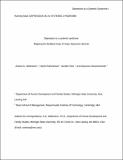| dc.contributor.author | Wittenborn, A. K. | |
| dc.contributor.author | Rick, J. | |
| dc.contributor.author | Hosseinichimeh, N. | |
| dc.contributor.author | Rahmandad, Hazhir | |
| dc.date.accessioned | 2017-09-05T19:54:03Z | |
| dc.date.available | 2017-09-05T19:54:03Z | |
| dc.date.issued | 2017-09-05 | |
| dc.identifier.issn | 0033-2917 | |
| dc.identifier.issn | 1469-8978 | |
| dc.identifier.uri | http://hdl.handle.net/1721.1/111133 | |
| dc.description.abstract | Depression is a complex public health problem with considerable variation in treatment response. The systemic complexity of depression, or the feedback processes among diverse drivers of the disorder, contribute to the persistence of depression. This paper extends prior attempts to understand the complex causal feedback mechanisms that underlie depression by presenting the first broad boundary causal loop diagram of depression dynamics.
We applied qualitative system dynamics methods to map the broad feedback mechanisms of depression. We used a structured approach to identify candidate causal mechanisms of depression in the literature. We assessed the strength of empirical support for each mechanism and prioritized those with support from validation studies. Through an iterative process, we synthesized the empirical literature and created a conceptual model of major depressive disorder.
The literature review and synthesis resulted in the development of the first causal loop diagram of reinforcing feedback processes of depression. It proposes candidate drivers of illness, or inertial factors, and their temporal functioning, as well as the interactions among drivers of depression. The final causal loop diagram defines 13 key reinforcing feedback loops that involve nine candidate drivers of depression.
Future research is needed to expand upon this initial model of depression dynamics. Quantitative extensions may result in a better understanding of the systemic syndrome of depression and contribute to personalized methods of evaluation, prevention and intervention. | en_US |
| dc.description.sponsorship | National Institute of Mental Health (U.S.) (Award R21MH100515) | en_US |
| dc.language.iso | en_US | |
| dc.publisher | Cambridge University Press | en_US |
| dc.relation.isversionof | http://dx.doi.org/10.1017/s0033291715002044 | en_US |
| dc.rights | Creative Commons Attribution-Noncommercial-Share Alike | en_US |
| dc.rights.uri | http://creativecommons.org/licenses/by-nc-sa/4.0/ | en_US |
| dc.source | Prof. Rahmandad via Shikha Sharma | en_US |
| dc.title | Depression as a systemic syndrome: mapping the feedback loops of major depressive disorder | en_US |
| dc.type | Article | en_US |
| dc.identifier.citation | Wittenborn, A. K. et al. “Depression as a Systemic Syndrome: Mapping the Feedback Loops of Major Depressive Disorder.” Psychological Medicine 46, 3 (December 2015): 551–562. © 2015 Cambridge University Press | en_US |
| dc.contributor.department | Sloan School of Management | en_US |
| dc.contributor.mitauthor | Rahmandad, Hazhir | |
| dc.relation.journal | Psychological Medicine | en_US |
| dc.eprint.version | Author's final manuscript | en_US |
| dc.type.uri | http://purl.org/eprint/type/JournalArticle | en_US |
| eprint.status | http://purl.org/eprint/status/PeerReviewed | en_US |
| dspace.orderedauthors | Wittenborn, A. K.; Rahmandad, H.; Rick, J.; Hosseinichimeh, N. | en_US |
| dspace.embargo.terms | N | en_US |
| dc.identifier.orcid | https://orcid.org/0000-0002-2784-9042 | |
| mit.license | OPEN_ACCESS_POLICY | en_US |
